Written by: Jackie Dilworth, Communications Director for The Arc of the United States
Updated: May 7, 2024
Journalists, are people with disabilities and disability issues at the forefront of your coverage? With over 61 million Americans and 1 billion people globally living with a disability, we all know and love someone with a disability. Yet this large and influential community remains underrepresented in media narratives. Too often, disability stories perpetuate negative stereotypes, reduce people to inspirational tropes, or oversimplify their diverse experiences and intersectional identities.
The Arc has driven disability rights for nearly 75 years, and we want to help you elevate authentic and diverse disability perspectives across all beats. Building on last year’s overlooked topics, we’re bringing you five new timely topics that demand greater attention. We hope this gives you a starting point to investigate the systemic barriers, discrimination, and lack of access and representation that people with disabilities face every day.
Here are 5 crucial angles you should report on in:
1. Disability Pride Month
July marks Disability Pride Month, commemorating the anniversary of the Americans with Disabilities Act (ADA). Yet this annual celebration championing disability rights and human diversity rarely shows up in news programs or stories. Just like American Heart Month or Autism Acceptance Month, Disability Pride Month has rich storytelling potential. What began as grassroots parades asserting disabled people’s rights to live freely has evolved into a global movement accepting each disabled person’s uniqueness and rejecting ableism and societal pressures on non-normative bodies. It’s also an opportunity to rally around policy priorities like health care access and barriers to employment and education.
Capture the intersectional perspectives uplifting disability pride across races, LGBTQ+ identities, disability types, and other marginalized groups. Spotlight trailblazing activists and organizations continuing the fight for inclusion. Analyze how companies and governments are following through on accessibility commitments.
Don’t let inspiration porn define your coverage. Disability Pride symbolizes resilience, beauty in human diversity, and the notion that disabled lives are equally valued. Uplifting authentic voices can reshape attitudes and catalyze change in your community.
2. The Child Care Crisis
Like all parents, parents of children with disabilities want to see their child thrive, and child care is crucial to that. As you cover America’s overarching child care accessibility and affordability crisis, consider a too-often overlooked angle: the severe obstacles facing families of children with intellectual and developmental disabilities (IDD).
These families confront the most difficult barriers in finding trusted, safe, developmentally appropriate child care. Many providers outright deny services to children with IDD or prematurely expel them, deeming accommodations too burdensome despite legal requirements. Research found 1 in 6 children with autism have been kicked out of child care.
Affordable, inclusive child care programs are scarce, and the consequences are devastating. Without reliable care, parents are forced to make career sacrifices, losing income and opportunities, which only adds to their extreme stress. Children with IDD miss pivotal social and developmental experiences alongside their peers. Congress has recently taken notice of this crisis, asking the Government Accountability Office to conduct a first-ever study on the difficulties that parents of children with disabilities face in finding child care. Numerous constituents of The Arc shared their experiences for the study.
Investigate nearby centers’ admission and expulsion policies. Hold providers accountable for discriminatory practices. Encourage local parents of nondisabled children to foster inclusion and acceptance of disabled children. Spotlight the economic and emotional toll this crisis leaves on parents of children with disabilities. Center these marginalized families in your storytelling.
The experiences of families of children with disabilities must be part of this national crisis.
3. Election 2024
This election cycle carries enormous significance for Americans with disabilities, the nation’s largest minority voting bloc. Yet their perspectives and the policies shaping their daily lives are consistently overlooked in candidate debates, interviews, and media narratives. Disability cuts across every community and every issue, from education and employment to health care access and criminal justice reform. Candidates’ stances on these topics will profoundly impact disabled voters’ quality of life. And new federal guidance from the Department of Justice reinforces that the ADA prohibits discrimination in voting and protects the rights of people with disabilities.
Spotlight the diverse perspectives and policy priorities from disability advocates. Investigate how proposals on safety nets like Medicaid and Social Security will tangibly affect this population’s independence and economic mobility. Ask the tough questions about how candidates will address systemic barriers and discrimination that shut out disabled voters.
Most crucially, ensure your coverage itself is accessible and inclusive. Center disabled voices as sources and authors, not just subjects. Consciously counter biases and tropes about disability in language and graphics you use.
We hope your election coverage will elevate the disability community’s needs as frontline issues. Here’s a guide to help you get started.
4. The Social Security Customer Service Crisis
When people apply for crucial Social Security benefits, the process should be fair, prompt, and accessible. But for far too many, that’s not the reality.
The Social Security Administration (SSA) is the gatekeeper to disability benefits that millions of people with disabilities rely on for survival. Unfortunately, they’re facing a customer service crisis after more than a decade of underinvestment, rapidly expanding workloads, and record-high staff attrition. Its administrative budget has been cut by 20% over 9 years, now making up less than 1% of benefits paid, a stark contrast to what private insurers spend on overhead.
The consequences have been devastating. Over 1.1 million initial disability claims are currently pending, almost double pre-pandemic levels. Thousands of people are dying each year while desperately waiting for the income and insurance they need to survive.
Disability advocates have been sounding the alarm, demanding action from Congress. The Arc recently joined 22 organizations urging lawmakers to properly fund the SSA through the President’s budget request. They must give this agency the resources and staffing it needs to promptly and fairly adjudicate claims, upholding people with disabilities’ life-sustaining benefits and basic human dignity.
If you cover this nationally-recognized crisis, don’t overlook the experiences of people with disabilities. Localize the claims delays impacting your community. Hold leaders and lawmakers accountable for solutions. Elevate the stories of people with disabilities who are struggling to navigate life without these crucial benefits. Their stories are what will compel overdue reform.
5. AI in the Classroom
As artificial intelligence (AI) rapidly evolves, you can’t overlook its complex impact on education, especially for students with disabilities. There are opportunities, but also equity and ethical concerns to navigate.
The potential upsides? AI can tailor educational materials to individual needs and learning styles, benefiting students who require customized instruction. Additionally, AI boost accessibility for students with disabilities by converting content into visuals, simplified language, text-to-speech, or speech-to-text. Algorithms analyzing student data could also identify trends and patterns that can inform tailored instructional strategies and interventions.
But AI bias is a major risk. If trained on data underrepresenting or stereotyping certain groups, the system’s recommendations could entrench discrimination against students with disabilities. There are also ethical and privacy issues around consent, autonomy, and the appropriate use of student data. Clear guidelines and safeguards are vital to protect students’ rights and well-being.
Localize this nationally-relevant topic by scrutinizing your school district’s AI policies and spending. Gather perspectives from educators, parents, and students themselves. How are they mitigating bias and protecting students with disabilities? Is AI’s efficiency inadvertently diminishing human interaction’s role?
As always, center the rights and needs of the disability community. Hold AI companies accountable for inclusivity and ethical design from the start. Highlight work making AI truly accessible and empowering for disabled students. By examining AI’s complex classroom implications, your coverage can drive thoughtful dialogue and ensure no student is left behind.
BONUS Topic: Discrimination & Criminalization of Parents With Disabilities
As journalists ramp up Mother’s Day and Father’s Day content, one perspective is often missing: the experiences of disabled parents. This glaring oversight perpetuates harmful biases that parents with disabilities face, leading to widespread discrimination and even family separations.
Despite having the same dreams of raising children as everyone else, parents with IDD are shockingly overrepresented in the child welfare system. Up to 80% permanently lose custody due to prejudicial doubts about their caregiving abilities rather than evidence of neglect or abuse.
For all their resilience, parents with IDD also face everyday discrimination as they navigate life as a parent, from educators to cashiers. Stories humanizing their loving bonds and advocacy battles are urgently needed.
This Mother’s, Father’s, and Parent’s Day, celebrate their journeys through authentic, nuanced profiles. Highlight the support systems sustaining parents with disabilities. Elevate disabled parents’ own experiences to counter negative stereotypes about them being “unfit.” Spotlight their pride, resilience, and devotion to their children. Most crucially, include video, images, and stories of parents with disabilities in your everyday coverage of parenting topics.
This angle offers fresh perspectives that will strengthen your holiday storytelling and year-round diversity coverage.
Please contact us at dilworth@thearc.org if you need sources, background information, or other issues. Also, be sure to visit our Press Center to find guides on reporting on disability. We are excited to see your impactful work!
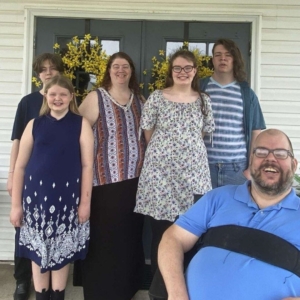 This Father’s Day, we’re celebrating Mike, a dad whose unconditional love and devotion are redefining society’s views on parenthood. Born with cerebral palsy, Mike has navigated life from a wheelchair, facing prejudices that often wrongly question the ability of those with disabilities to raise children.
This Father’s Day, we’re celebrating Mike, a dad whose unconditional love and devotion are redefining society’s views on parenthood. Born with cerebral palsy, Mike has navigated life from a wheelchair, facing prejudices that often wrongly question the ability of those with disabilities to raise children.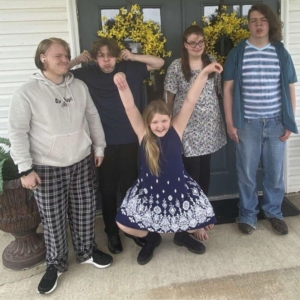 His disability has no impact on his ability to empower his children’s pursuit of interests and passions, from sports to church activities. He also teaches life skills and moral values to youth as a deacon and youth counselor at his church and a coach for Junior Church. His ultimate advice to other parents with disabilities? “God chose you to raise this child – you can do it! Keep working at it and don’t give up.” His oldest is already planning for his future, with his sights set on graphics design or counseling.
His disability has no impact on his ability to empower his children’s pursuit of interests and passions, from sports to church activities. He also teaches life skills and moral values to youth as a deacon and youth counselor at his church and a coach for Junior Church. His ultimate advice to other parents with disabilities? “God chose you to raise this child – you can do it! Keep working at it and don’t give up.” His oldest is already planning for his future, with his sights set on graphics design or counseling.
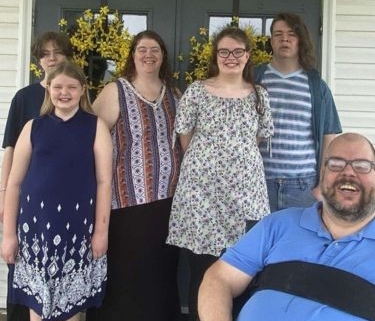
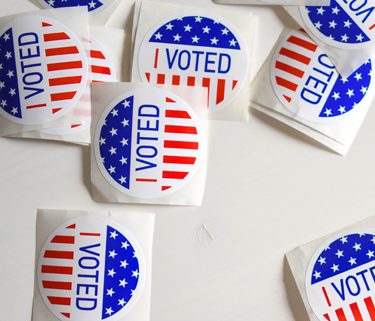
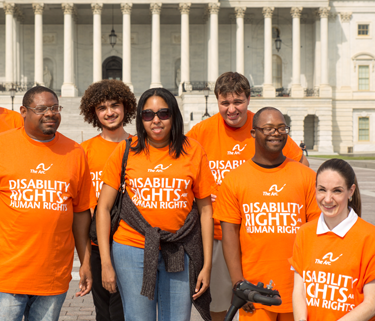
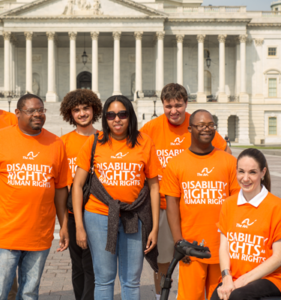 For some, August can be a time for camping trips, beach days, and other fun summer activities. But for members of Congress, August signals the start of Congressional Recess. During August recess, U.S. senators and representatives leave Washington, DC, and travel to their home states and districts to begin a fast-paced schedule of constituent meetings, town halls, and other community events.
For some, August can be a time for camping trips, beach days, and other fun summer activities. But for members of Congress, August signals the start of Congressional Recess. During August recess, U.S. senators and representatives leave Washington, DC, and travel to their home states and districts to begin a fast-paced schedule of constituent meetings, town halls, and other community events.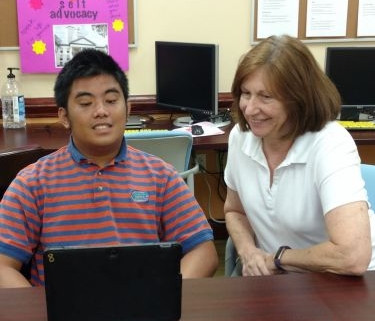
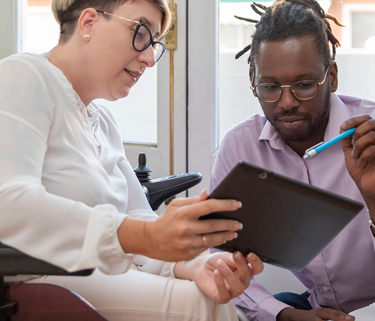
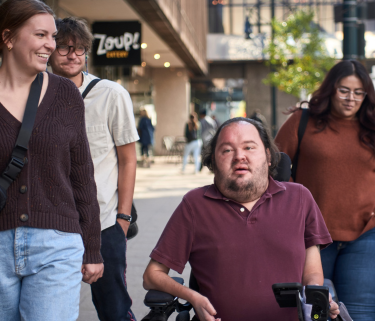


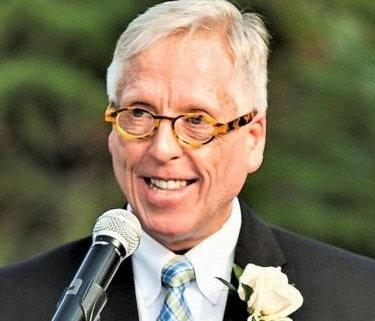
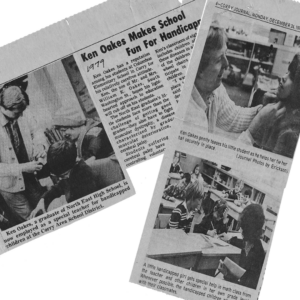
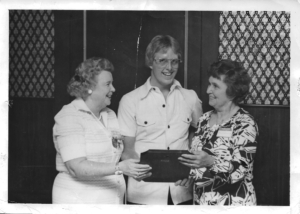 His impact on students didn’t stop in the classroom. After his career as a teacher, he went on to become the Special Education Director in Philadelphia and now teaches graduate school, supervises teachers, and was just appointed by the Governor to serve on Pennsylvania’s Special Education Advisory Panel. He also continued to volunteer with The Arc. “I think I did everything possible with The Arc.” In 2005, The Arc of Pennsylvania asked Ken to represent The Arc on the state’s Right to Education Task Force, which later led to his joining the Boards of The Arc of Philadelphia and The Arc of Pennsylvania, where he served as president of both organizations. He learned more and more about The Arc of the United States and was eager to get involved. He went to National Conventions, joined Committees, and eventually joined the national Board. “I went from organizing days at the zoo to becoming the national President—I was flabbergasted,” shares Ken.
His impact on students didn’t stop in the classroom. After his career as a teacher, he went on to become the Special Education Director in Philadelphia and now teaches graduate school, supervises teachers, and was just appointed by the Governor to serve on Pennsylvania’s Special Education Advisory Panel. He also continued to volunteer with The Arc. “I think I did everything possible with The Arc.” In 2005, The Arc of Pennsylvania asked Ken to represent The Arc on the state’s Right to Education Task Force, which later led to his joining the Boards of The Arc of Philadelphia and The Arc of Pennsylvania, where he served as president of both organizations. He learned more and more about The Arc of the United States and was eager to get involved. He went to National Conventions, joined Committees, and eventually joined the national Board. “I went from organizing days at the zoo to becoming the national President—I was flabbergasted,” shares Ken.






